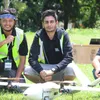With IRCTC and Cultfit as clients, Wobot uses AI to detect food hygiene and other safety parameters
Delhi-based Wobot is an AI-powered computer vision SaaS that helps hospitality, food, retail, and manufacturing businesses monitor operations. The startup currently has 2,000 installations, and is looking to scale its subscription model.
It’s no secret that food business is operationally-intensive. Some of the core challenges faced by the sector include maintaining hygiene, productivity, customer experience standards, and pilferage leakages.
To combat this in a burgeoning hospitality sector, Adit Chhabra, Pranav Anand, Tanay Dixit, and Tapan Dixit started Wobot.ai in 2018 in Delhi. It is an AI-powered computer vision SaaS that helps hospitality, food, retail, and manufacturing businesses monitor operations.
The machine learning-based app empowers auditors and inspecting officials with a digitised way to seamless operations.
What does it do?
Wobot.ai currently offers various modules that look into hygiene, food safety, pilferage, and customer experience. Its plug-and-play tool is connected to an existing CCTV or any other camera to help detect and track anomalies in standard operating procedures (SOPs).
It helps keep an eye on whether people are cooking with or without hair nets, if they are using gloves for packaging, whether safety attire or uniforms are worn or not, floor cleanliness, the quality of raw material, number of valid transactions at a restaurant (to prevent pilferage), and even checks whether guest interactions are happening as per SOP or not.

Wobot Team image
“There was always a need to bring in a component of external validation at the time of audits. That was when we shifted our focus to video analytics. Using the existing CCTV infrastructure, it was possible to do regular or random audits - this gave birth to the idea of Wobot.ai,” says Adit.
The monitoring platform then provides actionable insights and a cost-effective and autonomous way of monitoring SOPs across kitchens, restaurants, hotels, and is even useful in the manufacturing and retail sectors. The AI system is configured to detect anomalies across personnel hygiene, cleanliness, as well as raw material quality.
Working on the SOPs
With the recent boom in eating out, online food ordering, and the ever-increasing number of brands catering from cloud kitchens, Adit felt there was a dire need to ensure that proper hygiene standards are being followed. Hence, he started Wobot to keep a check on food quality parameters in the hospitality industry.
In terms of scaling the product and while working with customers, the Wobot team also realised the need for external validation in compliances and internal SOPs.
“Today, automating SOPs is one of Wobot’s core pillars, and its proprietary activity recognition and person re-identification architecture coupled with unsupervised learning is revolutionising the delivery of relevant video content,” says Adit.
Building the team
According to Adit, building the team was a time-consuming task. Adit roped in Pranav, who he knew through their undergraduate studies at Purdue University. Brothers Tapan and Tanay, who had worked on building innovative deep learning products in the past, joined in to complete the “think-tank.”
“Initially, we had built a machine learning app with a focus on empowering auditors and inspecting officials with a digitised way of doing things. The core team strongly believed there was a huge gap in daily monitoring of compliance issues in the hospitality sector,” says Adit.
Apart from the four founders, the team has over 35 people.
AI in foodtech and future plans
The need for AI in foodtech is fast growing. The Indian online food delivery market is said to be $4 billion, according to a RedSeer Report. And unicorns like Swiggy and Zomato too are looking to use AI and analytics to improve services.
Some of the other players in the hospitality market include Kochi-based Agrima Infotech that lets a consumer scan a food item, and then suggests recipes with those ingredients. Bengaluru-based Euphotic Labs has built an automated cooking machine. Wobot is among the startups focussed purely on production and operation.
Wobot currently has over 2,000 installations and collaborations with partners such as IRCTC, CultFit, Barista, Travel Food Services, EatFit, and Blue Tokai to name a few. It follows a subscription model and charges Rs 250 per camera/model/month.
The team recently raised an undisclosed funding round from a few well-known angels, and is now planning Series A round over the next quarter. Wobot claims to have seen a 70 percent growth in its ARR, and a 250 percent increase in customer base in the past six months.
(Edited by Suruchi Kapur Gomes)









